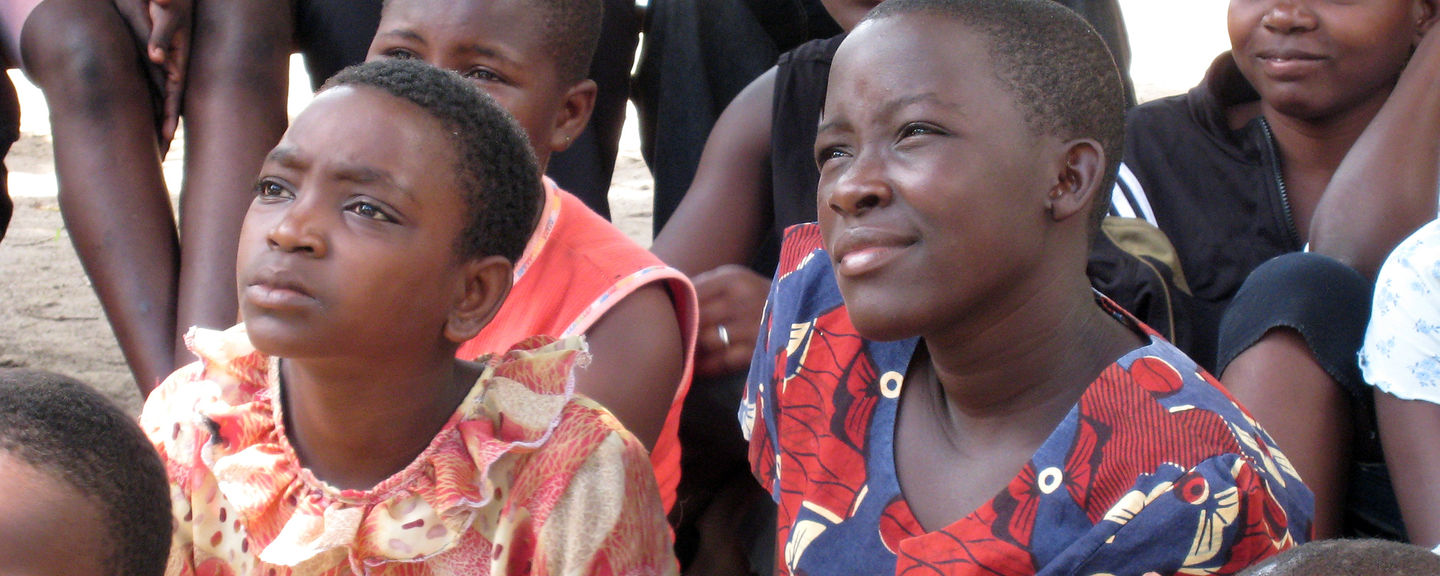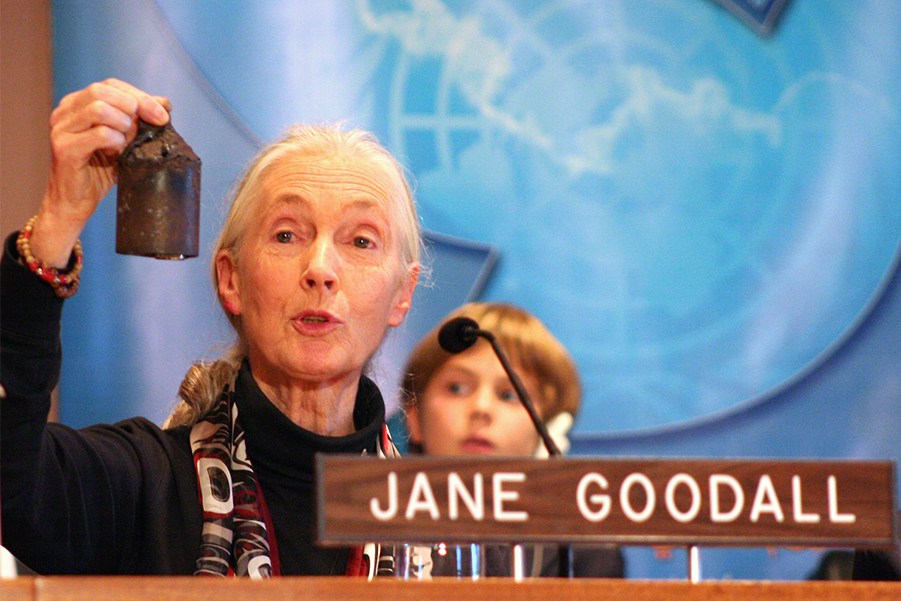Our Perspectives

Advocacy

When Dr. Jane Goodall and JGI speaks, people listen. We use our voice as an organisation to speak up on the issues that matter for the long-term well-being of humans, other animals and the planet we all share.
Dr. Goodall has long been an advocate for the dignity and well-being of all living things, and the Jane Goodall Institute shares her belief that speaking out on behalf of those who cannot speak for themselves is our responsibility as fellow inhabitants of this shared earth. Environmental advocacy, animal welfare and human rights are just a few of the issues we are passionate about both by being thought leaders and influencers, and by bringing all voices into discussion rooms on topics that matter.
Policy That Protects & Leads to Progress
JGI promotes this ideology when we seek to affect the laws and policies that impact the lives of people, animals and the environment. Whether it be combatting the use of chimpanzees in the media, working to end the use of great apes as biomedical test subjects, protecting the rights of indigenous peoples, or speaking out in favour of legislature and coalitions we believe will have a positive impact on our planet- JGI takes action to make the world a better place by influencing the powerful systems which run it. While we have succeeded in many areas – there is more work to do. Change starts with passion, and our passion is only growing.
What We Can Do About Climate Change
Plastic Bags & A Ban For New Zealand
Single-use plastic bags, when discarded, pollute the environment and harm animals. Many are burned which releases harmful toxins into the atmosphere. Thousands are dumped in landfills where they sit for an unknown length of time, some say up to 1000 years. Yet others end up littering our streets and countryside - many animals ingest those that contain food remains and may die as a result. Worst of all, millions end up in rivers and oceans where they contribute to an estimated 100,000 marine mammal deaths each year often because they are mistaken for jelly fish.
These bags eventually break down into tiny particles (micro-plastics), releasing toxic chemicals as they do so. These not only contaminate the ocean but end up in our food and water supply and have been found in human blood. (They have been linked to the risk of cancer, birth defects and other health problems).
Is the convenience of these bags really worth the impact on animals, people and the environment? People and countries around the world are saying NO. Now it is time for New Zealand to say no also, and BAN THE BAG.
The Jane Goodall Institutes youth movement, Roots & Shoots (for young people of all ages in 100 countries including New Zealand), has launched a major campaign to rid the world of plastic bags and bottles, six-pack rings and plastic straws etc)
I add my voice to the call from New Zealand corporations, organisations and people for the New Zealand government to legislate against the production and use of these bags. I desperately hope that New Zealand will reduce the impact of non recycling non biodegradable bags in your own beautiful county. The only way is to BAN THE BAG so please sign on to this important call for action..
Every individual makes an impact on the planet every day, and if we all make ethical choices the cumulative impact will be huge.
Together we CAN make a positive difference for all.
- DR JANE GOODALL
Animal Sentience
JGI & Zoos
I sometimes think, as I watch a compatible group of chimpanzees in a large exhibit in a well run, well funded zoo, that I would probably trade my freedom for that life if I lived in constant fear of losing my forest home, suffering the agony of tight wire around my hand, or having my mother shot. In other words, a good zoo can provide a home for animals that may be preferable to many places in the wild. And which is, of course, infinitely preferable to a life of servitude in medical research laboratories or entertainment (circus, movies, advertising).
In an ideal world all animals would live free in the wild, safe from interference by human beings. The sad reality is that neither chimpanzees nor humans live in an ideal world. The Jane Goodall Institute recognizes that it will take a global community of governments, conservation agencies, local people, youth, zoos and many others to make the commitment, create a change, and align in our work to conserve the world’s wildlife.
Children can learn about wild animals by watching films, but can this really compare with standing opposite a living chimpanzee and looking into his or her eyes, sensing the presence of a living, sapient and sentient Being? Such a special interaction with a chimpanzee (or other wild animal) can have a powerful effect on both child and adult observers. And thus realize how important it is to protect them and their forest homes in Africa. Chimpanzees in zoos can serve as ambassadors for their species in the wild and assist in raising awareness for the need to help conservation in Africa. All zoos should have education programs about the plight of animals in the wild and contribute a percentage of their revenues for conservation efforts in the wild.
JGI NZ & Dr. Jane on NZ's Predator Free Objective
Invasive alien species have a particularly devastating effect on isolated ecosystems and are a clear cause of species extinction. Island states are clearly the most vulnerable. The issues raised are never straightforward and legitimate arguments can be raised both for and against direct intervention.
When confronted by a risk to native species caused by introduced predator species all non-lethal options must be considered before a policy of euthanasia against any species is considered. Every species, native or recently introduced, has an inalienable right to life which JGI should be prepared to fearlessly protect.
If a lethal option has to be pursued it should be done in the most humane manner possible in order to minimise the stress and suffering caused to the introduced species both as regards individual animals and the population as a whole.
It will never be appropriate for Roots & Shoots groups to be directly or indirectly involved in directly assisting with any lethal option. Whilst a central requirement of any Roots & Shoots group is to ensure education and information as to the issues raised and the solutions proposed, Roots & Shoots member under the age of 16 should not be asked to raise money directly for such options nor become indirectly involved, such as being involved in the trapping of animals who are to be subject to euthanasia.
End Ivory Trade In New Zealand
Dr. Jane - A Vegetarian
Dr. Jane is indeed a vegetarian. She became a vegetarian after reading about intensive farming, not knowing about what the animals actually went through. The next time she looked at a piece of meat, Dr. Jane thought, this symbolizes fear, pain and death.
The JGI NZ Logo

Jane. Animals. Environment. People. The koru (Maori for "loop") is a spiral based on the shape of a new unfurling silver fern frond and symbolising new life, growth, strength and peace. It is an integral symbol in Maori art, carving and tattoos. Its circular shape conveys the idea of perpetual movement, and its inward coil suggests a return to the point of origin. The koru symbolises the way in which life both changes and stays the same.